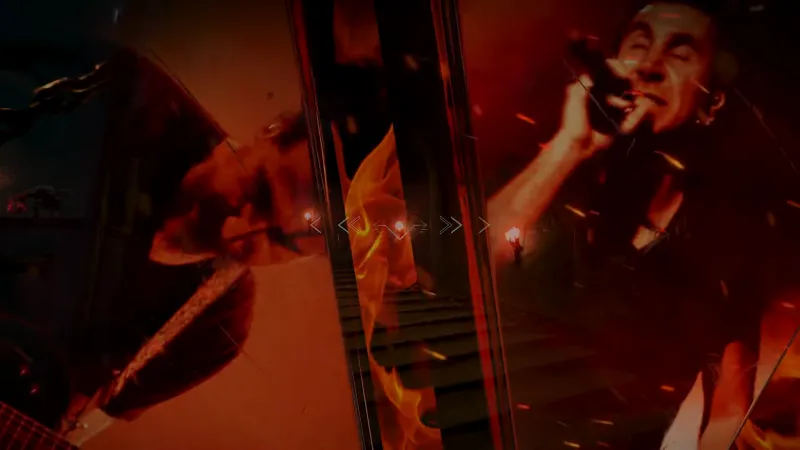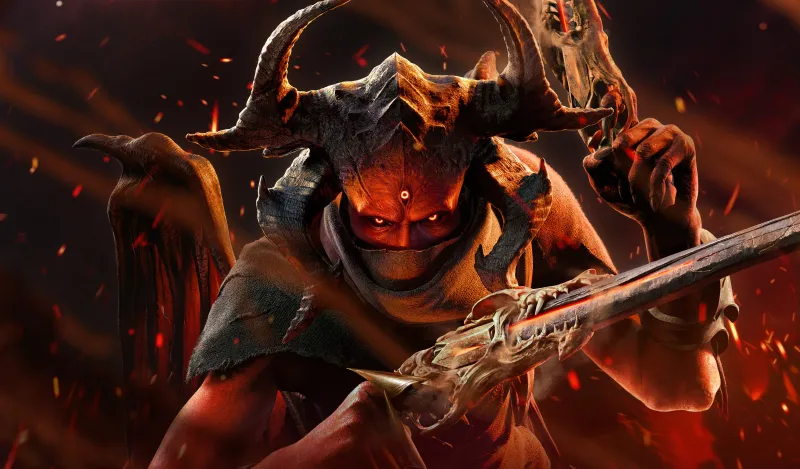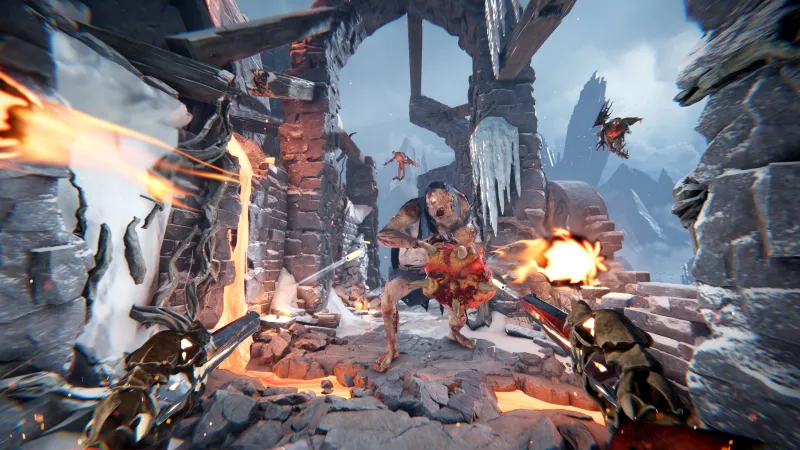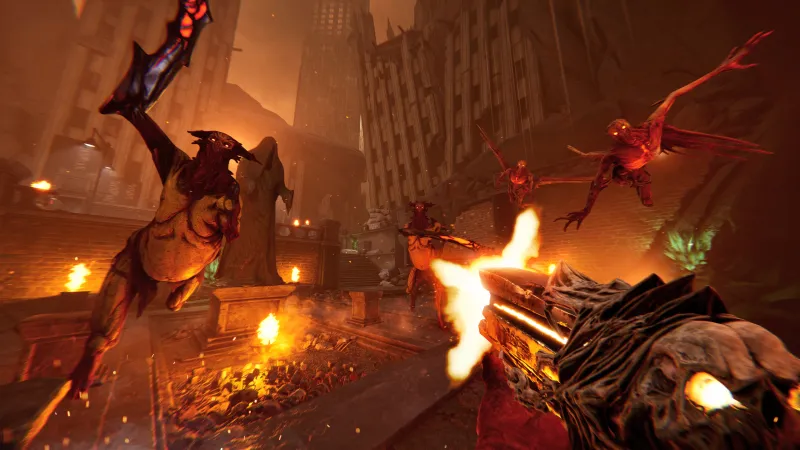
When you look at Metal Hellsinger, it may look like it takes many of the conventions established in games like Doom, complete with the heavy metal soundtrack players associate with the demon-slaying franchise. But with clever implementation of said metal music, Metal Hellsinger looks to transcend the spiritual successor label to become something else entirely.
By combining that fast-paced, frenetic first-person shooting action with rhythm-based mechanics that reward you for shooting in sync with the music, Metal Hellsinger delivers a wholly unique experience. While the gameplay conventions help separate the game from the pack, it’s perhaps the original soundtrack that is most eye-catching. As you slay your way through the demons of Metal Hellsinger, you do it to original recordings by some of metal’s biggest names. The soundtrack features all-new vocal performances from the likes of Matt Heafy of Trivium, Randy Blythe of Lamb of God, Alissa White-Gluz of Arch Enemy, Tatiana Shmayluk of Jinjer), and more.
The most recent addition to the soundtrack is Serj Tankian, best known as the frontman of the Grammy Award-winning System of a Down. We caught up with Tankian to learn about the process of recording this song, how creating music for movies and video games is different from a standalone album, and why he doesn’t play too many video games these days.
How did this opportunity to perform a song for Metal Hellsinger come across your desk?
I think my manager got an email from Sweden regarding the project and I looked into it. And I got really excited because, number one, it’s over the top, and anything other the top is always welcome in the world, creatively, musically. I remember going and seeing some of the other tracks by other artists – Randy Blythe, Matt Heafy, Alissa White-Gluz, et cetera – and they were really cool, like really awesome heavy death metal tracks. And then a small snippet of game – it wasn’t ready or anything – but they were showing like a small snippet of it and then the track that they would want me to collaborate on. It’s a seven-minute track and I’m like “Whoa.” It’s a f—ing rollercoaster of a track and I think that’s what got me. I was like, “Uh, wow. This is all over the place and something you can really dig your teeth into creatively and do something interesting.” So that piqued my interest and excitement.
One thing that creative director David Goldfarb praised about your performance is that you took what they gave you and you really made it your own. Can you talk a little bit about the process of getting the track they wanted you to record and how you went about approaching it?
So the composers… Two Feathers is how they call themselves, and Elvira [Björkman] is one of the Feathers, one of the composers. She had sent a track with some kind of vocal ideas. There were actually two kinds: one was more kind of really hard and one was mellower, melodic I would say. I had listened to the instrumental first and then I listened to the vocal ideas. Kind of like how I listen to temp music when I’m scoring a film, I like to listen to it and then put it away so that something creative comes out of me. So at points, I wanted to see what they had in mind, but at the same time I wanted to… whatever original vocal melody-wise would come out of me, kind of reply because my voice is gonna really sync well to that, whatever comes out.
That’s kind of what I did, and we went back a couple of times just fixing stuff, making things better, and, you know, edits here, edits there. I really, really enjoyed the process and the track goes from really heavy to really melodic, and beautiful singing, and there’s a gothy moment there. There’s all sorts of really cool vibes. I really enjoyed doing it. And at the same time, I was working on a classical vocal track for another streaming series and scoring two series of my own, so I was going between all this stuff and it’s great having diverse music to work on simultaneously because it brings out other elements of your creativity, naturally.
How did that cross-pollination work with this track and your other projects going on? Did you have any elements from the more classical score that you’re putting together infiltrate into the Metal Hellsinger track?
Not consciously, but I think when you’re working on different things at the same time, you’re influenced by all of it simultaneously. Because you’re hearing it all, it’s in your head, maybe the choral pieces or whatever. I have a number of projects, one of which is very operatic, and so maybe that immediately climbed into the video game because that choral is singing in my head and just layered my own voice. I don’t know. It’s hard to pinpoint it, but it’s cool when that happens.
Did you get any immediate feedback from the development team when you provided the track?
Yeah, they really liked it! They just had a set of notes for me to look at. There are a few I addressed and some I gave reasoning for that wouldn’t work or whatever. You know, just kind of very specific way of working and it’s good. I like working with people that have specific inputs because it helps save everyone time rather than general input, which could be misinterpreted. They really knew what they wanted, but also gave me the freedom to explore and do whatever I wanted to do with the track. I think the combination came out great.

How does creating music for a project such as a film or video game differ from creating music for, say, a System of a Down album?
I’ve got to first say that the song itself and the music was created by other composers. I just sang on this myself, obviously, for the game, but I’ve done game composing and I’ve done a lot of film and series composing. The way that it’s different is it challenges you to be creative within limitations, whereas when you’re writing your own stuff, there are no limitations that can occur; your own skill set is your limitation, really, in terms of ideas. But the challenge is to be creative within those limitations because each visual project has a set tempo, and a set vibe the creatives from that project, whether it’s the director or producers, have a certain idea of what they want in terms of sound tone, instrumentation. I find all of that really helpful, to be honest, because the more I can glean what it is that they’re looking for, the more I can be creative within that environment and give something that works for everyone quicker and faster.
And I still get to do something I’ve never done before! And do it in a really creative way within those elements. So, I find that interesting. My whole life as an artist, my goal was to always make something new every time. So, with films and video games and soundtracks, I literally make a whole new type of record every time because each project wants something completely different. I try to push that boundary as well, so that if I’m doing something that’s very organic and orchestral, for example, on one project, something comes along that I think would sound great in an analog-synth kind of way, I’d be like, “What do you think about analog-synth just taking over this project?” And if the director loves it, I go there because at that point, I’m excited about that, and because I’m doing the orchestral already. All of that works its way in as well in terms of the diversity of the projects.
With this track, though, it seems like it really played into the strengths that a lot of people know you for. It’s kind of like an in-your-face, kicked down the door hard rock or metal vibe that you’ve provided for so many of your biggest hits. How did it feel to have them kind of let you run wild with that familiar vibe?
It’s kind of funny because when I posted about this track, it got an incredibly strong reaction, and then I’ll post, like, a poetry track with some cinematic music that doesn’t get that same reaction. But a good chef makes both pizza and cordon bleu, knowing that most people are going to eat the pizza. But it’s great having that reaction from people because it’s what I’m known for and my voice goes there easily. I was looking at the Google Alert pickups that I get every day, and I’m like, “F—! There’s a lot of pickups on this!” It’s what people gravitate toward and it’s cool!
The metal thing is kind of funny because in most collaborations, I stay away from rock as much as I can, not on purpose, but because I’ve done so much of it that I get a lot of repetitive stuff coming to me for collaborations. And I’m like, I’ve been there, done that. I’ll go with a classical project or a cellist or an electronic project or something totally different. And in this case, it was totally different because it was total metal. It was like, really heavy and really crazy and really over-the-top, so for me, that was exciting! It wasn’t just in my wheelhouse, but above and beyond it in some ways.

And I’m assuming you’ve seen the trailer that features your track. How did you like the way the gameplay plays out to the beat of your track?
I think that’s unique about this game. They’ve taken the whole idea of Guitar Hero or whatever in terms of the rhythmic syncopation of the music with the player and apply it to the full environment as a game. That makes this game very unique from what I’ve understood. I still haven’t played the game fully, but I’m looking forward to checking it out! I think that’s really cool. Someone said, “Yeah, it’s a video game for musicians,” but it’s not! It tests your rhythm, basically. I think it’s cool. Everyone is trying to find a new kind of thing to do in the creative world and I think I appreciate that because there’s so much repetitiveness in every genre of the arts.
While you haven’t played this game yet, do you play a lot of video games in general?
I haven’t played video games in so many years. When I did play video games, I was quite addicted to them because once I go in, I’m just in there, you know? And I started messing up my thumbs from the controllers’ sticks. At one point, I was like, “I shouldn’t.” It’s the same reason I stopped playing full-body basketball, because I kept hurting my hands and knees and stuff. I’m like, “I’ve gotta play music! I need these things!” [Laughs] I’m like, “I can’t do this!” I remember I was wearing out my thumbs.
This happens to me every number of years: I’ll get in touch with a video game company and they’ll send me a game and I’ll be like, “I don’t have a box!” and they’ll send me a box and these games and I get into them and then I have to give them away because I’m addicted. Years ago, it was NBA Jam in the ’90s and then in the 2000s it was Call of Duty because I was doing this thing for this one company and some songs for this one video game, and they had sent me a PlayStation and all these games. Then after that, it would be nighttime and I’d be going crazy, like, “Oh man, this is not good.” So now I stay away from video games so I can get work done! [Laughs]
NBA Jam is pretty near and dear to my heart as well. I grew up playing that, and now I have replica arcade cabinets for NBA Jam, Street Fighter, and Mortal Kombat in my basement.
Oh wow! That’s old school! [Laughs] Those are both amazing games as well. I played those, obviously. I’m not a big video game guy and I had never really been, but I played enough. I know how crazy you can get with them. I have friends that spend so much time on games. You’ve got to make time for it and know when it’s time to leave, you know?

You mentioned Guitar Hero earlier as a point of reference. Did you ever notice kids coming up to you and saying they discovered your solo music or System of a Down through games like Guitar Hero or Rock Band?
I’m sure there were, but I can’t recall right now. I’m sure that did happen. That’s rare because usually, people get into the music, then see it in the game and get excited, but I’m sure for so many young kids, probably, that was their first initiation into System of a Down or whatever. Same with other bands, I’m sure. I think that’s really cool as well: If you’re a kid getting into a video game and not really knowing a particular band or genre altogether and kind of getting introduced to them.
Speaking of music and video games, there’s a lot of hip-hop, there’s a lot of rock, there’s a lot of metal. I’m wondering if there are certain types – and now you have my creative mind going – if there’s music that hasn’t really been in video games that could be an interesting game to develop around that atmosphere and environment. I know there’s ambient stuff in ambient games, but just something, you know, like goth. Are there goth games with goth music? Maybe.
There are so many games that have taken interesting approaches to incorporating music into the experience. I’m sure you’ve played Tetris before. There’s a game called Tetris Effect where the music builds as you play through the puzzle, then by the time you finish, it’s this full-fledged song with music and ambiance and lyrics. It’s always so interesting seeing what developers can accomplish with unique approaches to bringing music into the experience.
Absolutely, and that whole kind of architecture of music within the games and how you go in this direction and it plays this, or you go in that direction and it plays this plus this. That whole architecture, I find it really insanely interesting. It’s like a f—ing science project trying to figure out how the music really works best within the game, minus static moments where it’s just static music. But in terms of actual gameplay, I find that really interesting. I can’t get my head around it. I just create music and give them a bunch of stems so that they can plug it all in and create layers and stuff.
Well now that I’ve gotten your wheels turning here, maybe we’ll see some amazing music game coming from your mind in the near future!
Yeah, if someone gave me the shot, maybe I’ll create one! [Laughs] That would be great!
Metal Hellsinger comes to PlayStation 5, Xbox Series X/S, and PC this year.
Source: Game Informer System Of A Down's Serj Tankian Talks His Contribution To Metal Hellsinger

